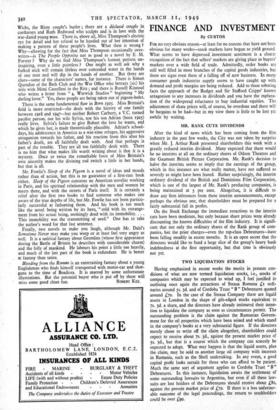FINANCE AND INVESTMENT
By CUSTOS
FOR no very obvious reason—at least for no reasons that have not been obvious for many weeks—stock markets have begun to yield ground. What seems to have depressed investment sentiment is a clearer recognition of the fact that sellers' markets are giving place to buyers' markets over a wide field of trade. Admittedly, order books are still well filled in most branches of the capital goods industries, but there are signs even there of a falling off of new business. In many consumer goods industries supply seems to have caught up with demand and profit margins are being reduced. Add to these sobering facts the approach of the Budget and Sir Stafford Cripps' known antagonism to any increases in dividends and you have the explana- tion of the widespread reluctance to buy industrial equities. The adjustment of share prices will, of course, be overdone and there will be bargains to be had—but in my view there is little to be lost yet awhile by waiting.
MR. RANK CUTS DIVIDENDS
After the kind of news which has been coming from the film industry in the past few weeks, the City was not taken by surprise when Mr. J. Arthur Rank presented shareholders this week with a greatly reduced interim dividend. Many expected that there would be no interims at all on the ordinary shares of Odeon Theatres and the Gaumont British Picture Corporation. Mr. Rank's decision to halve the interims seems to imply that the earnings of the group, which in this instance are what really matter, have not suffered so severely as might have been feared. Rather surprisingly, the interim ordinary dividend of the British and Dominions Film Corporation, which is one of the largest of Mr. Rank's producing companies, is being maintained at 5 per cent. Altogezi:-24., it is difficult to draw any firm inferences from these interim announcements, except perhaps the obvious one, that shareholders must be prepared for a fairly substantial fall in profits.
On the Stock Exchange the immediate reeactions to the interim cuts have been moderate, but only because share prices were already discounting the known difficulties of the film industry. It is signifi- cant that not only the ordinary shares of the Rank group of com- panies, bin the prior charges—even the top-class Debentures—have been falling steadily in recent months. It is an open secret that the directors would like to fund a large slice of the group's heavy bank indebtedness at the first opportunity, but that time is obviously not yet.
TWO LIQUIDATION STOCKS Having emphasised in recent weeks the merits in present con- ditions of what are now termed liquidation stocks, i.e., stocks of companies which may be expected to wind up, I feel justified in outlining once again the attractions of Steaua Romana Et ordi- naries around 5s. 3d. and of Cordoba Trust "B " Debentures quoted around £70. In the case of the Steaua Company there are liquid assets in London in the shape of gilt-edged stocks equivalent to 7s. 3d. a share, and the directors have already intimated their inten- tion to liquidate the company as soon as circumstances permit. The outstanding problem is the claim against the Rumanian Govern- ment for the oil properties which have been seized and which stand in the company's books at a very substantial figure. If the directors merely chose to write off the claim altogether, shareholders could expect to receive about 75. 3d., against the present market price of 5s. 3d., but that is a course which the company can scarcely be expected to adopt. What may happen is that the liquid assets, plus the claim, may be sold to another large oil company with interests in Rumania, such as the Shell undertaking. In any event, a good capital profit looks certain for those who can afford to be patient. Much the same sort of argument applies to Cordoba Trust "B" Debentures. In this instance, liquidation awaits the settlement of some outstanding lawsuits in Argentina, but even if all these law- suits are lost holders of the Debentures should receive about £8o, against the present market price of £70. If there is a less unfavour- able outcome of the legal proceedings, the return to stockholders could be over E90.






































 Previous page
Previous page